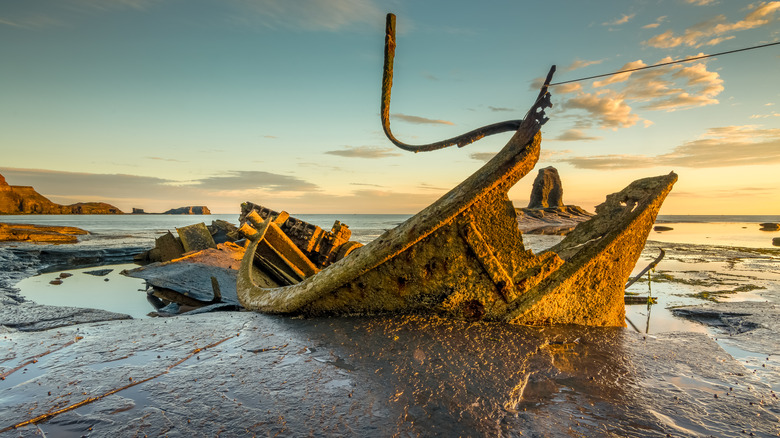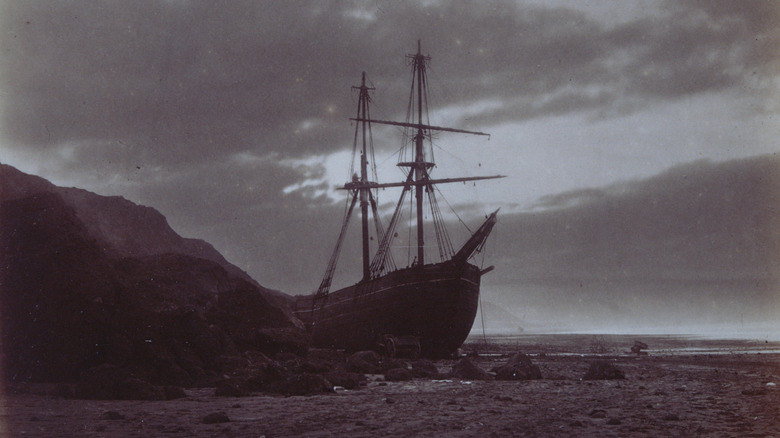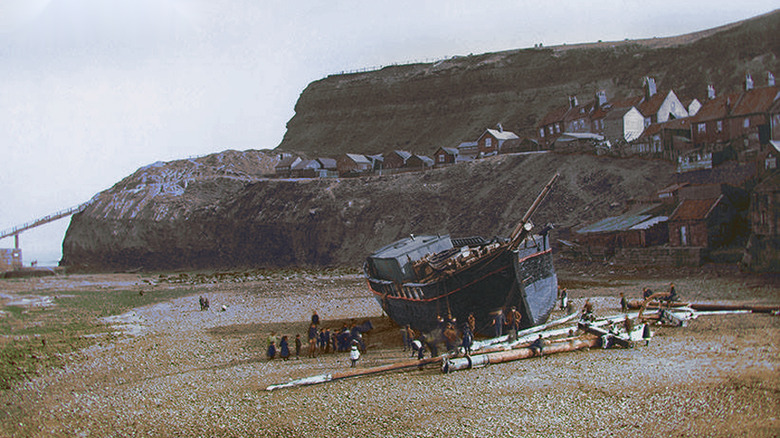The Last Voyage Of The Demeter: Was The Demeter A Real Ship?
The debt owed by Bram Stoker to the historical Vlad the Impaler for his novel "Dracula" is often overstated. Scholar Elizabeth Miller, who studied Stoker's working notes for the book extensively, made the case across many publications (including her own nonfiction "Dracula" book) that the Irish author only learned about Vlad Tepes relatively late in the writing process, which was spread over seven years, and didn't borrow much more than the name. The book was originally called "The Un-Dead," the vampire was originally named Count Wampyr, and none of the historical Dracula's atrocities were incorporated into the fictional one's backstory.
But if Stoker didn't avail himself of genuine Romanian history in creating his legendary vampire, he did draw on true events in other aspects of the novel. Though he never visited Transylvania himself, he made extensive use of books and maps to understand the geography and local customs of the region (albeit tinged with the prejudices of his English sources). The plot of "Dracula," contemporary to the time in which it was written, features the latest advancements in technology and medicine. And one incident in the book, carved out by DreamWorks and Universal Studios into the 2023 feature film "The Last Voyage of the Demeter," was taken from a real-life shipwreck.
What role does the Demeter play in 'Dracula?'
In "Dracula," the titular count has a longstanding plan to leave his native Transylvania and invade Britain, then on the rise towards its imperial apotheosis. To reach his new home, Dracula commissions the Demeter, a Russian sailing ship out of Varna, to transport "fifty cases of common earth, to be used for experimental purposes" (per "Dracula"). This "common earth" is Transylvanian soil, in which Dracula must rest to conserve his power. He stows away among these cases and spends the voyage feasting on the crew, who slowly recognize the evil presence on their ship but never learn what it is. While most fall victim to the count, others go mad and throw themselves overboard. In the end, only the captain remains, and he ties himself to the wheel to keep the Demeter bound for port.
In a violent storm, the Demeter runs aground on Whitby on August 8. An investigation finds the dead captain as the only soul aboard, except for a large dog that quickly escapes. His log, one of the many documents that make up the epistolary novel, provides the account of the voyage, while newspaper reports confirm that the dog — Dracula in the form of a wolf — is never found. His boxes are delivered to the Carfax estate he purchased from Jonathan Harker, the novel's hero, and later scattered throughout London as Dracula begins seeking out fresh blood.
The Dmitry and the Demeter
The town of Whitby was a strong influence on Bram Stoker in writing "Dracula." Besides serving as a location in the novel for key events and providing a suitable atmosphere for Gothic fiction, Michael Barsanti of the Rosenbach Library and Museum has said that it was in Whitby — a popular Stoker vacation spot — that the author first encountered the name of Dracula, according to "The Road to Dracula," (via YouTube). Stoker was also familiar with local history and news at Whitby. As a major shipping port, the town knew its share of offshore disasters and shipwrecks. One from 1885 took Stoker's fancy as a model for his own shipwreck in "Dracula."
The 1885 incident concerned the Dmitry, a Russian ship out of Antwerp that was sailing for Newcastle when it was caught in a violent storm. Per Heritage Gateway, the crew of the Dmitry managed to get her safely into the harbor, but the next day, the tide threw the ship ashore on Collier's Hope, cracking the masts. The crew had to abandon the ship, which was uninsured, and there was no way to restore the ship or get her back into the water. The Dmitry would have been left as a footnote of local history if Stoker hadn't fictionalized it as the Demeter. One important distinction, probably appreciated by the crew of the Dmitry, is that they outlived their ship.


